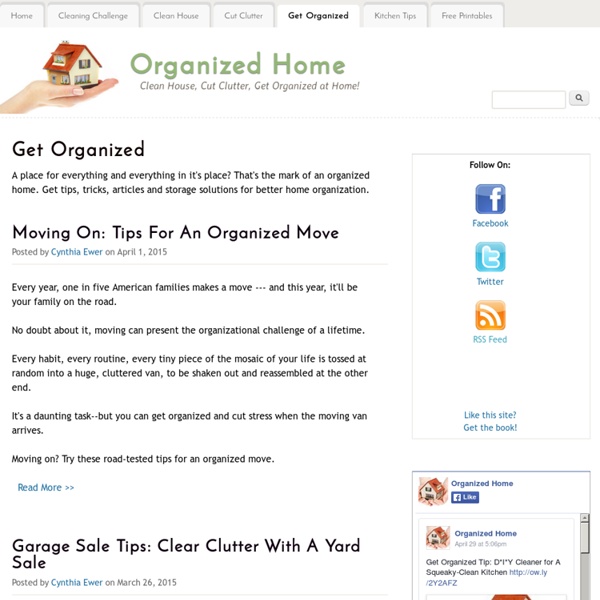



Declutter 101: Where Do I Start? Ready to cut clutter on the homefront--but not sure where to start? Standing amid the stacks and piles, it can be hard to find a good spot to dive in and begin. Too often, de-clutter efforts fizzle along with the light of day. This time, resolve to succeed! To get your organized journey off to a good start, try these clutter-cutting start points. They will help free a strangled household from the clutter monster. First Step: A Single Small Success At the outset, adjust your vision downward from the big (cluttered) picture, to zero in on one small, solvable clutter problem. Beginning your war against clutter with a small success provides welcome motivation for the long haul. Slow and Steady Progress Clutter tolerance seems to run a fever cycle, much like the flu. Just as clutter arises gradually, over time, so it must be fought gradually and over time. Resist the temptation to go all-out in fevered, short-term sorties against clutter. Schedule Declutter Sessions Trust me.
Shelf Reliance Garage Sale Tips: Clear Clutter With A Yard Sale Garage sale, tag sale, yard sale--whatever you call it, the garage or yard sale is part and parcel of the American way of life. On sunny weekend mornings, slow-moving cars ("I brake for yard sales!") circle suburban neighborhoods as their occupants hunt baby toys and panini makers, auto parts and cocktail shakers. If you're in active declutter mode, the next stop is your house! A yard sale can clear clutter and score some cash, but it helps to have a road map. Get organized for a yard sale with a free yard sale checklist and yard sale signs, then try these tips for a successful yard sale. Gather Your Inventory Your yard sale inventory is living right under your nose. How to decide? Challenge family members to contribute, and sweeten the deal by offering a cut of the profits. To get the most out of your yard sale, consider finding a clutter buddy. You'll need room to assess, clean and price your inventory, so choose a location that has space to work. Do Your Homework
I'm an Organizing Junkie — Living a life of simplicity and order Free Downloads Are you looking to simplify and organize your life? Choose from a variety of FREE planning forms below. You can download each form individually by clicking on the form’s name, or you can download all the forms in one category as a single file by clicking on the Master List beneath the heading. Feel free to print as many as you need! Budgeting Workbooks: Budgeting Workbook — this is the workbook I use to track all our finances. Daily Planners: Read more about how I use my daily planner. UPDATE: you can now get the Single planner in a fully editable format here. My Daily Planner – Single — This is the worksheet I use every day. Meal/Menu Planners: Shopping Planners: Shopping List: Organize your weekly shopping and easily pair coupons with in-store specials. Food Preserving Worksheets: Holiday Planner: Gift Inventory — Track your gift ideas, gifts purchased, and your spending. Miscellaneous:
Organised Chaos Ten Tips for Using Craigslist Have you ever purchased or sold anything on Craigslist? If not, let me fill you in on what you’re missing. It’s like the ultimate online garage sale! Here’s my latest purchase — just bought it today! I have used Craigslist extensively for the past 2 years. Sound good to you? If you would like to try out this awesome {and free} service, keep reading for a 10 helpful tips. 1. It is essential to post at least one photo of each item you are trying to sell. Use a digital camera {not a camera phone} and take one or more good photos from various angles. 2. Even though you may have paid top dollar for your items, it doesn’t mean you will be able to get your money back. It’s also a good idea to follow your price with, “or best offer”. 3. Disclose as much information as you can about the items you are trying to sell. The more honest you are, the easier it will be to find the right buyer…which will ultimately save you a bunch of time later on. 4. 5. 6. 7. 8. 9. 10. Did I miss anything?
bright and blithe My Time Budget I’ve always thought it was/is really important to create a financial budget and implement limits for yourself as to what you will and will not spend money on. However, over the last few years, I’ve also realized how important it is to decide what you will and will not spend your time on — so I created a “time budget”. This might be a foreign concept for some, but I’m convinced that a time budget is one of the best ways to stay focused, limit distractions, and get more done. What is a Time Budget? Don’t worry, it’s NOT fancy… I don’t even have a fun spreadsheet like my financial budget! A “Time Budget” is simply a map or chart that shows how you will spend the hours in your day. Here’s a really quick example of how to create your own time budget: For example: if I sleep for 7 hours, work with a client for 5 hours, work on my blog for 3 hours, and have a meeting for 2 hours, that only leaves 7 hours to do EVERYTHING else {get ready, eat and prepare meals, cleaning, errands, commute, etc}
Finding the calm in the chaos.